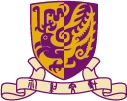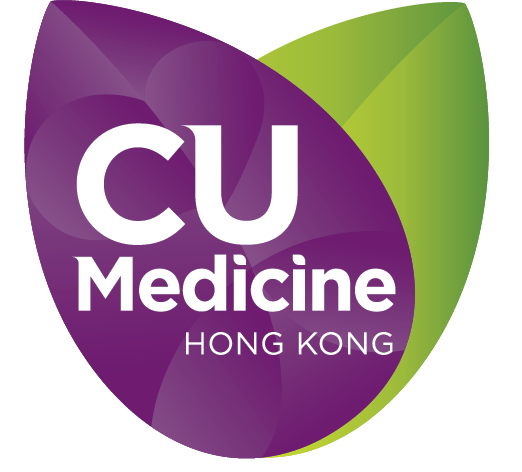
CUHK Launches First Chinese Medicine MOOC Course in English on Coursera Bringing Chinese Medicine Global and Household
The World Health Organization (WHO) has stated that, though Chinese medicine has been widely authorised and practised around the world, there is no sufficient platform to provide research data, related information or training. To cater for the international demand in education and scientific research evidence, a team from the Faculty of Medicine of The Chinese University of Hong Kong (CUHK) with a Western and Chinese medicine background has spent two years in developing a Chinese medicine course in English with the international Massive Open Online Course (MOOC) provider Coursera, and Asia's first Chinese medicine clinical evidence online portal which gathers studies from around the world.
The two online platforms were launched in the third quarter of 2017, with the aim to promote basic knowledge of traditional Chinese medicine as well as research data to overseas. The material will enable local and overseas healthcare professionals to have a better understanding of the efficacy of traditional medicine and hence bring it to the next level of development in the world.
Global thirst for research data and education platforms to promote usage of Chinese medicine
The 'WHO Traditional Medicine Strategy 2014-2023' released in 2012 stated that Chinese medicine has been widely authorised and practised around the world. Taking acupuncture as an example, around 80% of interviewed member states now recognise the use of acupuncture in their medical services. In countries with a high Chinese ethnic density such as Australia and the US, the demand for acupuncture has increased by 30% and 35% respectively in 5 to 10 years. Switzerland has integrated Chinese medicine under the coverage of its health insurance system for citizens. Each person received an average of six acupuncture treatments in 2012.
However, most of the member states have expressed frustration in trying to find research data to support the regulation of traditional and supplementary medicine. They hope the WHO can provide them with technical guidance on research and evaluation of Chinese medicine's safety, quality and efficacy. 40% of the member states reflected they are lack of resources in the education and training of traditional and supplementary medicine (including Chinese medicine) which limits the development of Chinese medicine.
Prof. Justin Che Yuen WU, Associate Dean, Faculty of Medicine, CUHK said, "The impact of traditional Chinese medicine is not limited to Asia. Its acceptance in the West is far beyond what we imagined and numerous overseas healthcare departments, healthcare professionals, patients and their family members are eager for more on education and scientific data. The Faculty of Medicine of CUHK has always been supportive of the education and development of Chinese medicine, our team from both Chinese and Western medicine backgrounds hopes to spread related knowledge to the world through technology and online resources. To promote universal education in Chinese medicine, we have collaborated with the internationally renowned MOOC platform Coursera, creating its first Chinese medicine course in English which helps individuals to learn basic Chinese medicine. The course is free of charge and can be accessed anytime and anywhere. To provide healthcare professionals and the general public with a convenient tool to understand Chinese medicine research papers, the CUHK team has developed an evidence-based online platform, namely 'Integrative Medicine Clinical Evidence Portal', gathering scientific research papers, and simplifying the study basics and findings into language that the public finds easy to digest."
Coursera's first Chinese medicine course in English encourages universal education
With an initial idea in 2015, the CUHK team spent two years with the target of creating a Chinese medicine course which is tailored to the needs of English speakers around the world, be they the general public or healthcare professionals. The course 'Everyday Chinese Medicine' had its soft launch in September this year.
The course is conducted by Chinese medicine professionals. There are five sessions in total with one session a week, and one hour for each session. The course is in video format combined with animation and graphics. It helps learners understand basic theories of Chinese medicine such as 'Yin-Yang', and 'Zang-Fu', causes of illness, 'Seven emotions and six exogenous factors', and diagnostic methods.
Ms. McKay Roozen, Regional Manager for Asia, Global Partnerships Team, Coursera, said, "We observed an emerging need in Chinese medicine education. We have worked with other institutions such as Shanghai Jiao Tong University to provide similar content in Chinese. Hence, Coursera decided to work with CUHK on our first Chinese medicine course in English, with the intention to reach interested learners, regardless of territory and background. The CUHK team has promising scholars with rich clinical experiences which added credibility to the course."
'Integrative Medicine Clinical Evidence Portal' assists healthcare professionals to master clinical research information
While the MOOC course satisfies the needs of the general public, the CUHK team established the 'The Integrative Medicine Clinical Evidence Portal' for healthcare professionals, the first of its kind in Asia.
Chinese medicine practitioner Dr. Vincent Chi Ho CHUNG, also Assistant Professor, Division of Family Medicine and Primary Health Care, Jockey Club School of Public Health and Primary Care and Associate Director (Education), Hong Kong Institute of Integrative Medicine, Faculty of Medicine, CUHK explained, "Medical research papers on Chinese medicine and complementary treatment are rather complicated and readers, even healthcare professionals, need a long time to search and interpret the research results. With that in mind, we have built this online portal targeting the healthcare professionals that allows users to look for studies through a simple keyword search via treatment or condition. We also tailor-made a system to rank the credibility of a study from several key factors such as study background and results. In all, we wish to provide a simple tool for anyone who is interested in the subject to learn its scientific proof and so to support the application and regulation of traditional and complementary medicine."
Professor WU concluded, "The CUHK team consists of medical practitioners from Western, Chinese medicine backgrounds and also epidemiology scholars from the School of Chinese Medicine, Hong Kong Institute of Integrative Medicine and the Jockey Club School of Public Health and Primary Care, consolidating the expertise from all parties to develop a credible tool for the public. Thanks to their two years of contribution and devotion, we successfully launched the two online platforms. The platforms work as a 'twin-track system' which advocates both the traditional Chinese medicine concept and modern scientific research evidence, so as to enhance Chinese medicine's global visibility and benefit patients. The two teaching platforms can also foster the interflow between Chinese and Western healthcare professionals and drive the development of integrated treatment."
Supplementary
About MOOC Platform Coursera
Coursera works with over 150 institutes around the world including Yale University and Stanford University, providing more than 2,000 courses that are available internationally. Coursera has over 29 million learners and continues to grow at a rapid pace. CUHK has partnered with Coursera since 2013 and this is the first medical course created in this partnership.
Baduanjin and integrative medicine. The production of the second phase is expected to start next year and be available in 2019.
About the 'Everyday Chinese Medicine'
This Chinese medicine course in English (https://www.coursera.org/learn/everyday-chinese-medicine) is taught by Chinese medicine teaching staff from the Faculty, the School of Chinese Medicine, the Hong Kong Institute of Integrative Medicine and the Jockey Club School of Public Health and Primary Care. Over 1,700 people have enrolled in the course since its soft launch in late September, with over 35% of the students from the US. The majority of students are from the US, Canada and India.
The first phase teaches basic theory, the second phase teaches herbs, acupuncture, self-therapy such as food therapy and Baduanjin and integrative medicine. The production of the second phase is expected to start next year and be available in 2019.
About the Integrative Medicine Clinical Evidence Portal
The Integrative Medicine Clinical Evidence Portal(www.hkiim.cuhk.edu.hk/ceim/tc)collected over 200 medical clinical trials and systematic reviews, categorised by intervention or by condition They were translated into user friendly synopses which are found effective in promoting the uptake of evidence on effectiveness and safety among healthcare professionals.
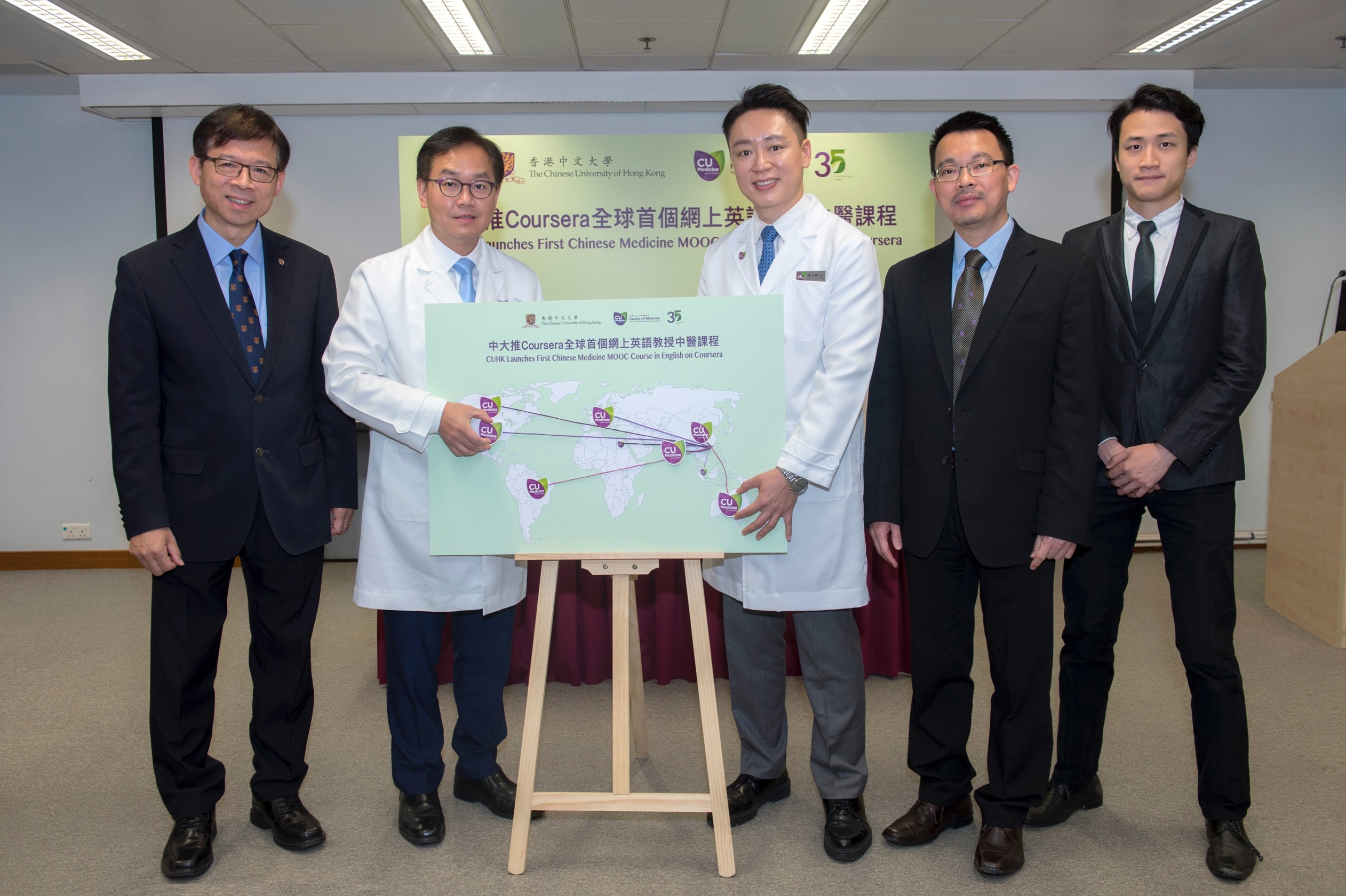
The Faculty of Medicine, CUHK launches the first Chinese medicine MOOC course in English on MOOC platform Coursera and Asia’s first Chinese medicine clinical evidence online portal which gathers studies over the world. The two platforms help bring Chinese medicine education global and household. From left: Prof. Ting Hung LEUNG, Director, School of Chinese Medicine; Prof. Justin Che Yuen WU, Associate Dean (Development); Dr. Vincent Chi Ho CHUNG, Chinese medicine practitioner, Associate Director (Education), Hong Kong Institute of Integrative Medicine; Prof. Zhixiu LIN, Associate Director, School of Chinese Medicine and Director, Hong Kong Institute of Integrative Medicine; Dr. Benjamin Lung Tang BUT, Teaching Assistant, School of Chinese Medicine. All are from the Faculty of Medicine at CUHK.
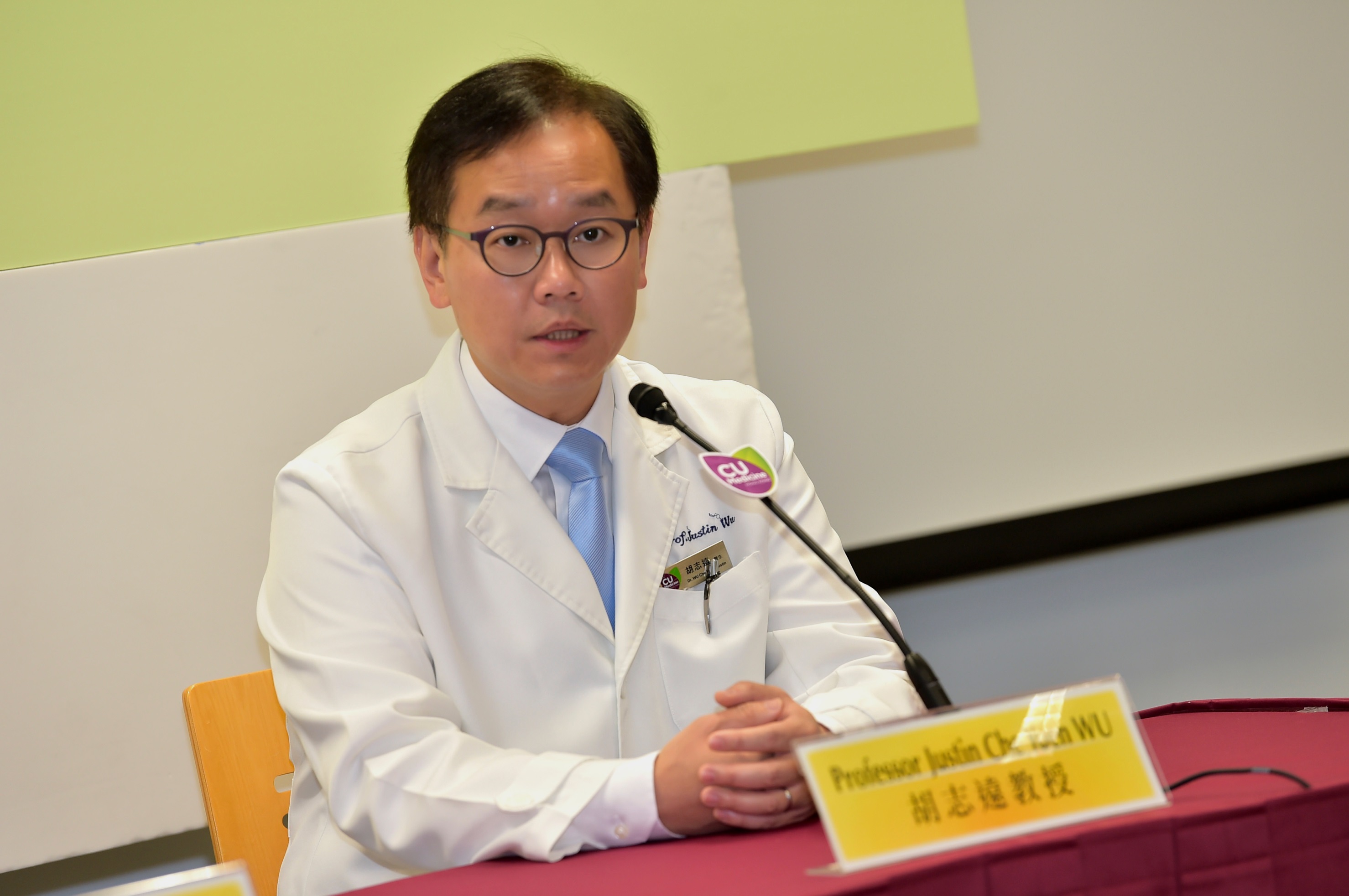
Prof. Justin WU believes the two novel platforms will help facilitate communications between healthcare professionals from Western and Chinese medicine background, and so to help bring Chinese medicine education global and household and to promote the development of integrative medicine.
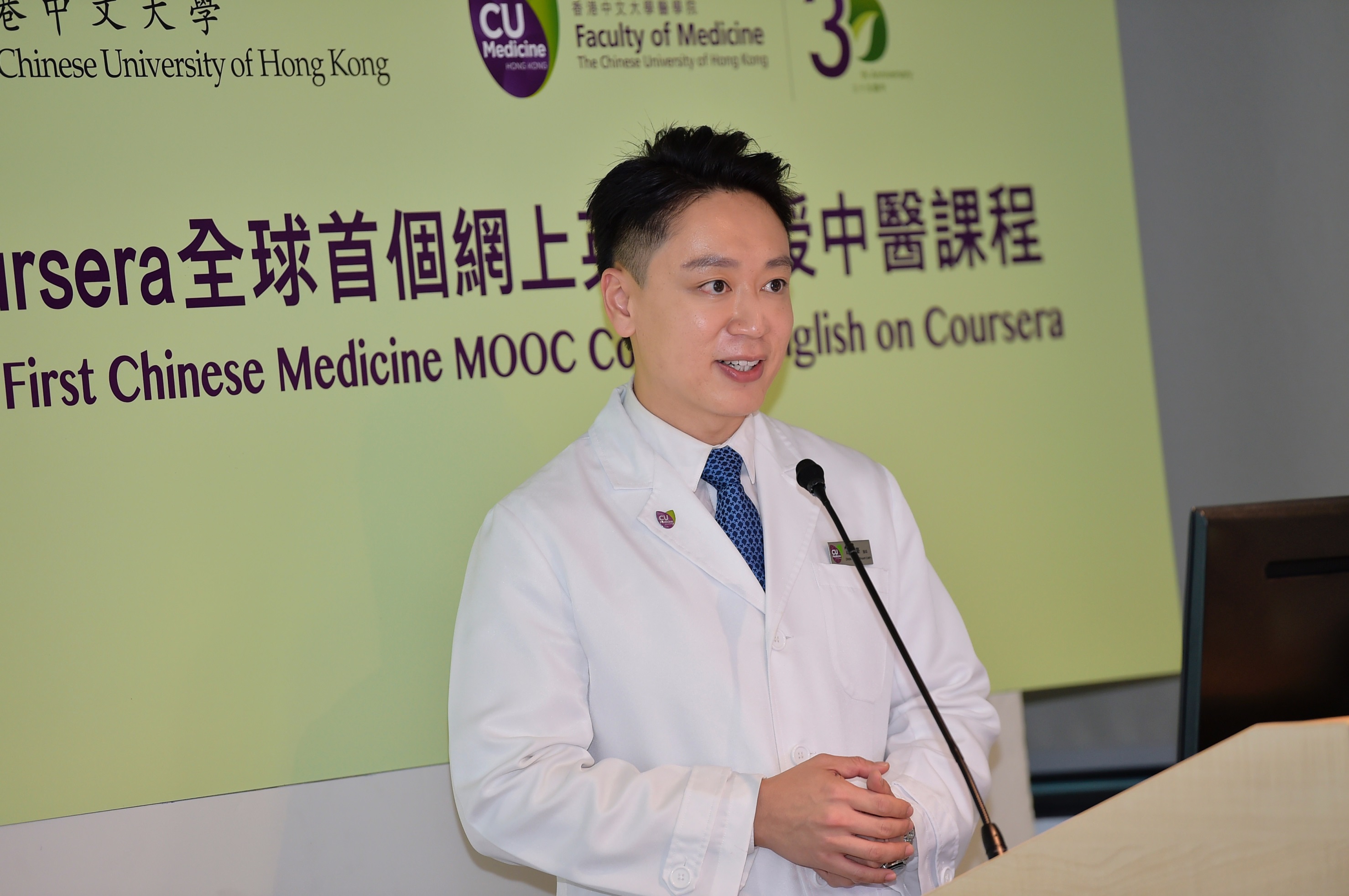
Dr. Vincent CHUNG says the ‘Integrative Medicine Clinical Evidence Portal’ developed by CUHK team can help healthcare professionals and general public understand the treatment of Western and Chinese medicine and clinical scientific evidence.
